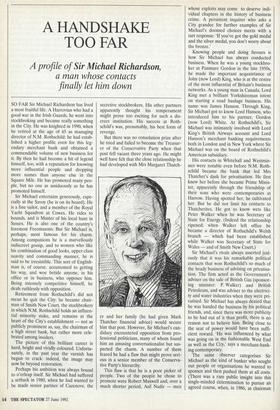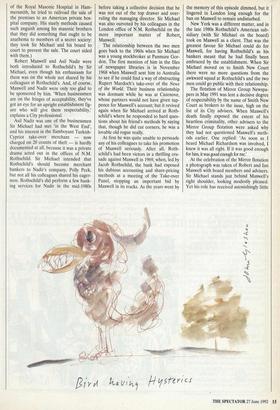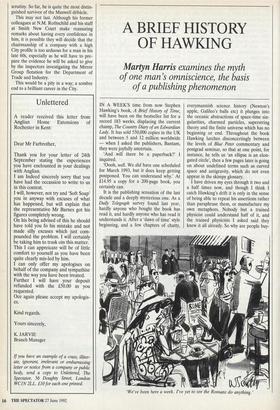A HANDSHAKE TOO FAR
A profile of Sir Michael Richardson,
a man whose contacts finally let him down
SO FAR Sir Michael Richardson has lived a most fruitful life. A Harrovian who had a good war in the Irish Guards, he went into stockbroking and became really something in the City. He was knighted in 1990, when he retired at the age of 65 as managing director of N.M. Rothschild: he had estab- lished a higher profile even for this leg- endary merchant bank and obtained a commendable volume of new business for it. By then he had become a bit of legend himself, too, with a reputation for knowing more influential people and dropping more names than anyone else in the Square Mile. He has promoted many peo- ple, but no one as assiduously as he has promoted himself.
Sir Michael entertains generously, espe- cially at the Savoy (he is on its board). He is a fine sailor, and a member of the Royal Yacht Squadron at Cowes. He rides to hounds, and is Master of his local hunt in Sussex. He is also one of the country's foremost Freemasons. But Sir Michael is, perhaps, most famous for his charm. Among companions he is a marvellously indiscreet gossip, and to women who like his combination of good looks, upper-class suavity and commanding manner, he is said to be irresistible. This sort of English- man is, of course, accustomed to getting his way, and woe betide anyone, in his office or in business, who opposes him. Being intensely competitive himself, he deals ruthlessly with opposition.
Retirement from Rothschild's did not mean he quit the City: he became chair- man of Smith New Court, the stockbrokers in which N.M. Rothschild holds an influen- tial minority stake, and remains at the heart of the City's establishment — not as publicly prominent as, say, the chairman of a high street bank, but rather more cele- brated among insiders.
The picture of this brilliant career is hard, bright and vividly coloured. Unfortu- nately, in the past year the varnish has begun to crack: indeed, the image may now be beyond restoration.
Perhaps his ambition was always bound to o'erleap itself. Sir Michael had suffered a setback in 1980, when he had wanted to be made senior partner of Cazenove, the secretive stockbrokers. His other partners apparently thought his temperament might prove too exciting for such a dis- creet institution. His success at Roth- schild's was, presumably, his best form of revenge.
But there was no consolation prize after he tried and failed to become the Treasur- er of the Conservative Party when that post fell vacant three years ago. He might well have felt that the close relationship he had developed with Mrs Margaret Thatch- er and her family (he had given Mark Thatcher financial advice) would secure him that post. However, Sir Michael's can- didacy encountered opposition from pro- fessional politicians, many of whom found him an amusing conversationalist but sus- pected the charm. A number of them feared he had a flaw that might prove seri- ous in a senior member of the Conserva- tive Party's hierarchy.
This flaw is that he is a poor picker of people. Two of the people he chose to promote were Robert Maxwell and, over a much shorter period, Asil Nadir — men
whose exploits may come to deserve indi- vidual chapters in the history of business crime. A persistent inquirer who asks a City grandee for further examples of Sir Michael's doomed choices meets with a tart response: 'If you've got the gold medal and the silver medal, you don't worry about the bronze.'
Knowing people and doing favours is how Sir Michael has always conducted business. When he was a young stockbro- ker at Panmure Gordon in the late 1950s, he made the important acquaintance of John (now Lord) King, who is at the centre of the most influential of Britain's business networks. As a young man in Canada, Lord King met a brilliant Yorkshireman intent on starting a road haulage business. His name was James Hanson. Through King, Sir Michael got to know Lord Hanson, who introduced him to his partner, Gordon (now Lord) White. At Rothschild's, Sir Michael was intimately involved with Lord King's British Airways account and Lord Hanson's merchant banking requirements both in London and in New York where Sir Michael was on the board of Rothschild's American subsidiary.
His contacts in Whitehall and Westmin- ster were notable even before N.M. Roth- schild became the bank that led Mrs Thatcher's dash for privatisation. He first knew her before she became Prime Minis- ter, apparently through the friendship of their sons who were contemporaries at Harrow. Having spotted her, he cultivated her. But he did not limit his contacts to Thatcherites. He got to know wets like Peter Walker when he was Secretary of State for Energy. (Indeed the relationship ripened; when Walker left office he became a director of Rothschild's Welsh branch — which had been established while Walker was Secretary of State for Wales — and of Smith New Court.)
Sir Michael's rivals always asserted jeal- ously that it was his remarkable political contacts that won Rothschild's so much of the heady business of advising on privatisa- tion. The firm acted as the Government's adviser on the sale of British Gas (sponsor- ing minister: P. Walker) and British Petroleum, and was adviser to the electrici- ty and water industries when they were pri- vatised. Sir Michael has always denied that he was handed the business by his political friends, and, since there was more publicity to be had out of it than profit, there is no reason not to believe him. Being close to the seat of power would have been suffi- cient reward. 'He was influenced by what was going on in the fashionable West End as well as the City,' says a merchant-bank- ing contemporary. The same observer categorises Sir Michael as the kind of banker who sought out people or organisations he wanted to sponsor and then pushed them at all costs. (There was a rare public insight into this single-minded determination to pursue an agreed course, when, in 1986, as chairman of the Royal Masonic Hospital in Ham- mersmith, he tried to railroad the sale of the premises to an American private hos- pital company. His steely methods caused such anguish among his masonic brothers that they did something that ought to be anathema to members of a secret society: they took Sir Michael and his board to court to prevent the sale. The court sided with them.) Robert Maxwell and Asil Nadir were both introduced to Rothschild's by Sir Michael, even though his enthusiasm for them was on the whole not shared by his colleagues at Rothschild's. And, of course, Maxwell and Nadir were only too glad to be sponsored by him. 'When businessmen are on the fringes of acceptability, they've got an eye for an upright establishment fig- ure who will give them respectability,' explains a City professional.
Asil Nadir was one of the businessmen Sir Michael had met 'in the West End', and his interest in the flamboyant Turkish- Cypriot take-over merchant — now charged on 20 counts of theft — is hardly documented at all, because it was a private drama acted out in the offices of N.M. Rothschild. Sir Michael intended that Rothschild's should become merchant bankers to Nadir's company, Polly Peck, but not all his colleagues shared his eager- ness. Rothschild's did perform a few bank- ing services for Nadir in the mid-1980s before taking a collective decision that he was not out of the top drawer and over- ruling the managing director. Sir Michael was also outvoted by his colleagues in the London office of N.M. Rothschild on the more important matter of Robert, Maxwell.
The relationship between the two men goes back to the 1960s when Sir Michael was a young stockbroker at Panmure Gor- don. The first mention of him in the files of newspaper libraries is in November 1968 when Maxwell sent him to Australia to see if he could find a way of obstructing Rupert Murdoch's take-over of the News of the World. Their business relationship was dormant while he was at Cazenove, whose partners would not have given tup- pence for Maxwell's account; but it revived again when Sir Michael arrived at Roth- schild's where he responded to hard ques- tions about his friend's methods by saying that, though he did cut corners, he was a lovable old rogue really.
At first he was quite unable to persuade any of his colleagues to take his promotion of Maxwell seriously. After all, Roth- schild's had been victors in a thrilling cru- sade against Maxwell in 1969, when, led by Jacob Rothschild, the bank had exposed his dubious accounting and share-pricing methods at a meeting of the Take-over Panel, stopping an important bid by Maxwell in its tracks. As the years went by the memory of this episode dimmed, but it lingered in London long enough for the ban on Maxwell to remain undisturbed.
New York was a different matter, and in the late 1980s Rothschild's American sub- sidiary (with Sir Michael on the board) took on Maxwell as a client. That was the greatest favour Sir Michael could do for Maxwell, for having Rothschild's as his bankers meant that he had finally been embraced by the establishment. When Sir Michael moved on to Smith New Court there were no more questions from the awkward squad at Rothschild's and the two men could go public with their relationship.
The flotation of Mirror Group Newspa- pers in May 1991 was lent a decisive degree of respectability by the name of Smith New Court as brokers to the issue, high on the list of its City advisers. When Maxwell's death finally exposed the extent of his heartless criminality, other advisers to the Mirror Group flotation were asked why they had not questioned Maxwell's meth- ods earlier. One replied: 'As soon as I heard Michael Richardson was involved, I knew it was all right. If it was good enough for him, it was good enough for me.'
At the celebration of the Mirror flotation a photograph was taken of Robert and Ian Maxwell with board members and advisers. Sir Michael stands just behind Maxwell's right shoulder, looking modestly pleased. Yet his role has received astonishingly little scrutiny. So far, he is quite the most distin- guished survivor of the Maxwell debacle.
This may not last. Although his former colleagues at N.M. Rothschild and his staff at Smith New Court make reassuring remarks about having every confidence in him, it is possible they will decide that the chairmanship of a company with a high City profile is too arduous for a man in his late 60s, especially as he will have to pre- pare the evidence he will be asked to give by the inspectors investigating the Mirror Group flotation for the Department of Trade and Industry.
This would be a pity in a way; a sombre end to a brilliant career in the City.




















































 Previous page
Previous page